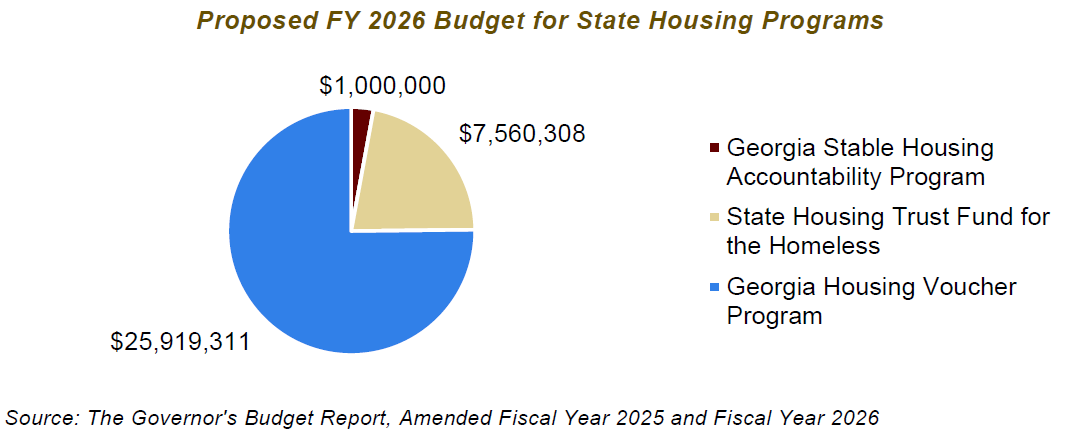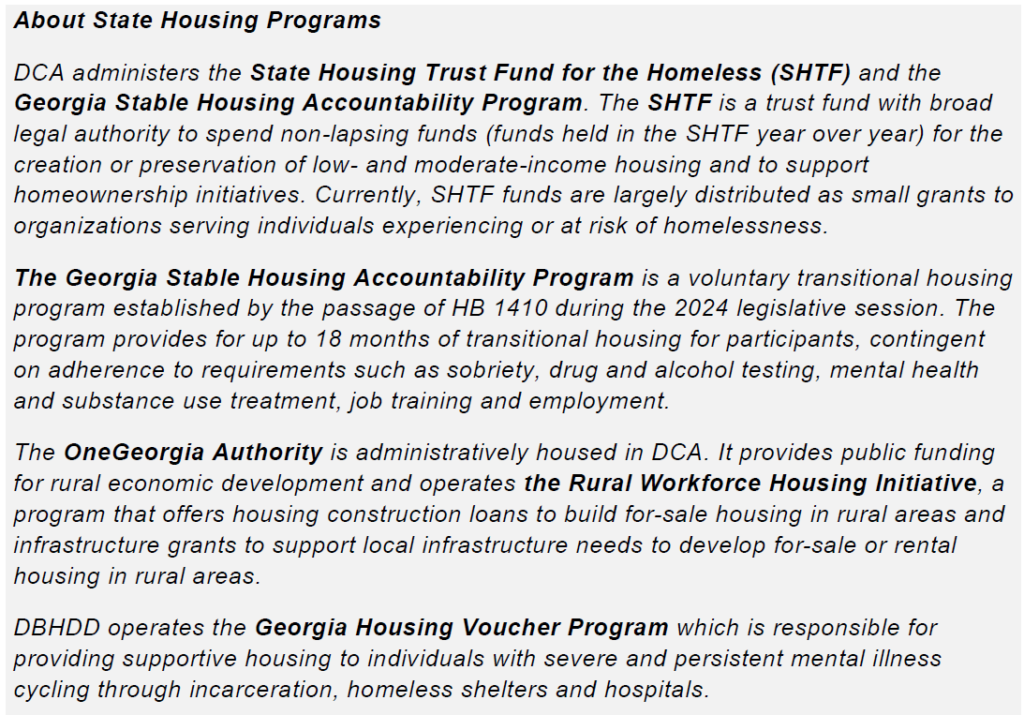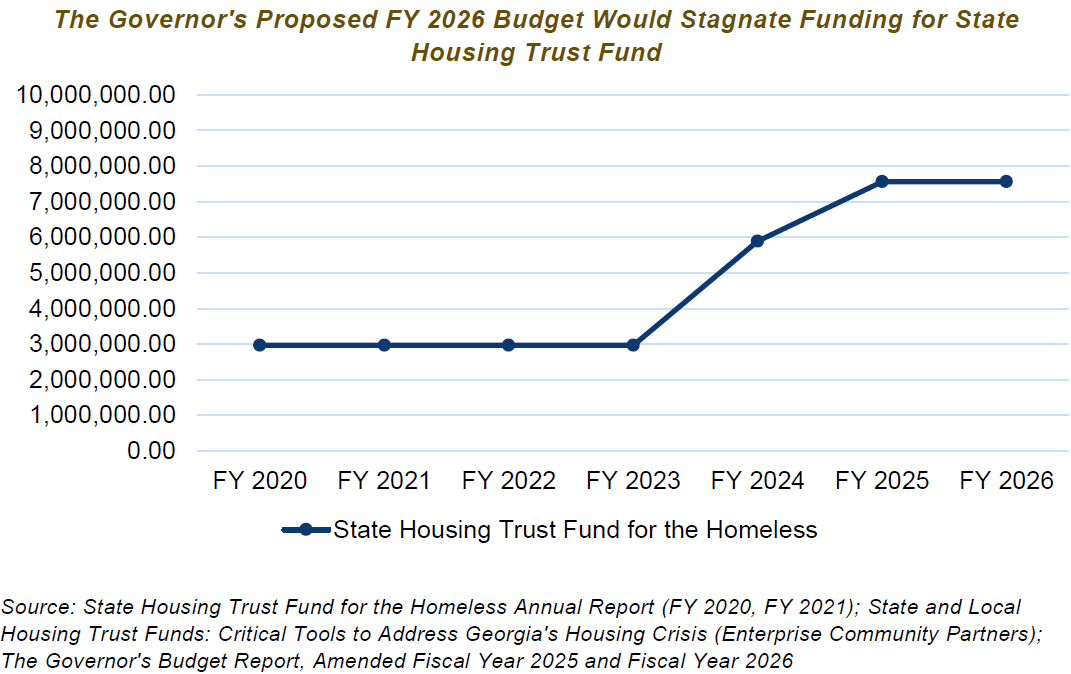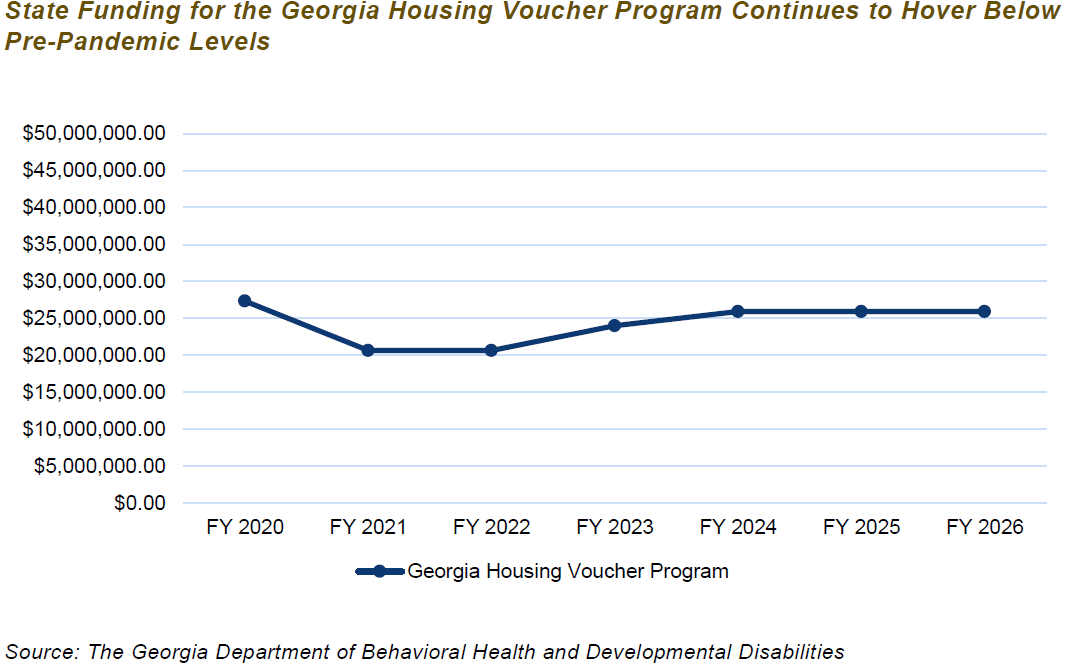Introduction
The Georgia Department of Community Affairs (DCA) is the state’s lead agency for safe and affordable housing, community and economic development and local government assistance. DCA’s housing services include providing rental assistance to low- and moderate-income individuals, providing down payment assistance to moderate-income individuals and financing affordable housing development and supportive housing. Additionally, DCA supports community and economic development across Georgia by offering economic development initiatives and tools, historic preservation services and comprehensive planning assistance and technical assistance to local governments.
The Georgia Department of Behavioral Health and Developmental Disabilities (DBHDD) performs a number of duties, including operating state psychiatric hospitals, providing forensic psychiatric services to determine individuals under the jurisdiction of the court system’s competency to stand trial and providing community-based services for individuals experiencing mental health conditions, substance use disorders and developmental disabilities. Among its programs includes the Georgia Housing Voucher Program. This overview will analyze DBHDD’s budget as it relates to housing (i.e., the Georgia Housing Voucher Program) only. A more detailed overview of the DBHDD budget is available separately.
The Governor proposed sending an additional $800.2 million in state funds to agencies attached to DCA in the proposed Amended Fiscal Year (AFY) 2025 budget and a $900,776 (or 1.4%) increase to DCA in the proposed Fiscal Year (FY) 2026 budget.¹ The Governor also proposed a $500,000 increase to DBHBDD in AFY 2025 and a $45.3 million increase to DBHDD in FY 2026. However, despite these proposed increases, none of the state’s housing programs would receive an increase in funding in FY 2026.

Budget Highlights for State Housing Programs

Amended Fiscal Year 2025 Budget
DCA
- $28 million increase to the OneGeorgia Authority to fund grants and loans through the Rural Workforce Housing Initiative
- No changes to the State Housing Trust Fund for the Homeless
- No changes to the Georgia Stable Housing Accountability Program
DBHDD
- No changes to the Georgia Housing Voucher Program
Fiscal Year 2026 Budget
DCA
- No changes to the State Housing Trust Fund for the Homeless
- No changes to the Georgia Stable Housing Accountability Program
DBHDD
- No changes to the Georgia Housing Voucher Program
Stagnated Funding for the State Housing Trust Fund Limits Versatile Tool to Address Georgia’s Housing Crisis
The State Housing Trust Fund for the Homeless (SHTF) was established in 1989 and is funded by the state. Its funding remained stagnant at around $3 million for decades and began to increase in 2023. In AFY 2024, a one-time increase of $2.9 million was made to leverage federal grant funds for the Youth Homelessness Demonstration Project, an initiative by the U.S. Department of Housing and Urban Development (HUD) that awards funds to selected communities across the United States to “develop a coordinated community approach to preventing and ending youth homelessness.”² In FY 2025, the SHTF received $4.6M to improve homelessness services and pursue federal grant opportunities.³

Demand for funding from SHTF substantially surpasses the resources at hand. In FY 2024, over $14.1 million in requests for Emergency Solutions Grants (ESG) funding were made to DCA. DCA was able to award about $4.7 million of those requested funds.⁴
The SHTF also has the legal authority to finance projects to support housing for low-income individuals, such as the acquisition, construction and renovation of rental housing and interest rate and down payment assistance programs to support homeownership.⁵ Although not currently used for these purposes, increased funding for the SHTF could enable the fund to move its work further upstream to not only support people experiencing or at imminent risk of homelessness, but to create housing opportunities that can address Georgians’ housing needs before individuals reach a point of crisis.
Despite Legal Obligation and Growing Need, Governor Proposes Level Funding for Georgia Housing Voucher Program
The Georgia Housing Voucher Program (GHVP) was created to meet the state’s obligation under the 2010 Olmstead Settlement Agreement to provide permanent supportive housing and wraparound services to 9,000 individuals with severe and persistent mental illness at risk of or currently experiencing homelessness. It is entirely state-funded. As of January 2025, approximately 2,200 individuals were being served through the GHVP.⁶
At the beginning of the COVID-19 pandemic, the GHVP experienced a significant reduction in funding. The program’s budget was cut by over 24% from FY 2020 to FY 2021, and its budget has never recovered to pre-pandemic levels. While the GHVP did receive funding increases in FY 2023 and FY 2024, its budget remains 5.2% lower than it was in FY 2020. Additionally, the legislature opted to keep the program’s funding level in FY 2025 while awaiting a response from the U.S. Department of Justice regarding the state’s compliance with the settlement agreement.⁷
While funding for the GHVP has remained stagnant, the cost to administer the program has continued to rise. From 2023 to 2024, median rent in Georgia increased by 16%.⁸ As the cost of housing increases, so does the cost to operate the GHVP. From January 2021 to September 2024, the average monthly rent subsidy paid by the GHVP increased by 74% from $652 to $1,133. Yet even with the increased costs for services, the GHVP remains a more cost-effective means of addressing chronic homelessness than continuing to cycle individuals experiencing homelessness through hospitals, incarceration and homeless shelters.⁹

Despite exceeding its budget in FY 2023, the GHVP has continued to see growth in demand for services. The program experienced a 23% increase in the number of households served between July 2023 and January 2024, growing from 2,067 households to 2,549 households in just 7 months.¹⁰ Due to this increase, DBHDD has had to divert referrals for supportive housing to the federally funded Housing Choice Voucher (HCV) Program and operate a waitlist since April 1, 2024.¹¹ It is important to note that the HCV is experiencing overwhelming demand and is not intended to be a substitute for the GHVP. DCA last opened applications for the HCV Program in 2023 and received over 177,000 applications for 13,000 waiting list spots in a matter of only four days.¹²
Endnotes
¹ There are two agencies attached to the Department of Community Affairs for administrative purposes: the Georgia Environmental Finance Authority and the OneGeorgia Authority.
² U.S. Department of Housing and Urban Development. (Accessed 2025, February 3). Youth Homelessness Demonstration Project. HUD Exchange. https://www.hudexchange.info/programs/yhdp/
³ Stephens, B., and Richie, C.S. (2024, November). State and Local Housing Trust Funds: Critical Tools to Address Georgia’s Housing Crisis. Enterprise Community Partners. https://www.enterprisecommunity.org/sites/default/files/2024-12/ec_housingtrustfunds_r6.pdf
⁴ Ibid.
⁵ Ibid.
⁶ HouseATL. (2025, January 30). Housing People who are Homeless with Mental Illness: Add $20 Million to DBHDD Georgia Housing Voucher Program.
⁷ Georgia General Assembly. (2023-2024 Regular Session). HB 916 – FY 2025 Appropriations Bill. https://www.legis.ga.gov/api/document/docs/default-source/house-budget-and-research-office-document-library/2025-fiscal-year/fy_2025_bill_conf_cmte_version_(hb_916).pdf?sfvrsn=cc4537c6_2
⁸ Jones, Jonathan. (2025, January 23). U.S. Cities With the Biggest Change in Rent Prices. Construction Coverage. https://constructioncoverage.com/research/cities-with-the-largest-rent-increases-decreases
⁹ HouseATL. (2025, January 30). Housing People who are Homeless with Mental Illness: Add $20 Million to DBHDD Georgia Housing Voucher Program.
¹⁰ Ibid.
¹¹ Robinson, L., and Ruppersburg, M. (2024, July 22). Behavioral Health Reform and Innovation Commission Supportive Housing Presentation. Department of Behavioral Health and Developmental Disabilities. https://dbhdd.georgia.gov/document/meeting-presentation/bhric-summary-ppt-72224pdf/download
¹² Associated Press. (2023, October 25). Georgia agency gets 177,000 applications for housing aid, but only has 13,000 spots on waiting list. WABE. https://www.wabe.org/georgia-agency-gets-177000-applications-for-housing-aid-but-only-has-13000-spots-on-waiting-list/










